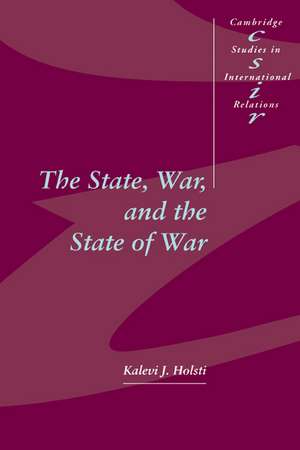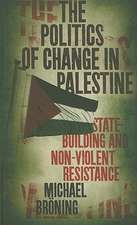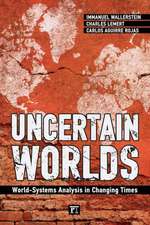The State, War, and the State of War: Cambridge Studies in International Relations, cartea 51
Autor Kalevi J. Holstien Limba Engleză Paperback – 27 aug 1996
| Toate formatele și edițiile | Preț | Express |
|---|---|---|
| Paperback (1) | 238.52 lei 6-8 săpt. | |
| Cambridge University Press – 27 aug 1996 | 238.52 lei 6-8 săpt. | |
| Hardback (1) | 812.72 lei 6-8 săpt. | |
| Cambridge University Press – 27 aug 1996 | 812.72 lei 6-8 săpt. |
Din seria Cambridge Studies in International Relations
-
 Preț: 200.78 lei
Preț: 200.78 lei -
 Preț: 190.01 lei
Preț: 190.01 lei -
 Preț: 198.89 lei
Preț: 198.89 lei -
 Preț: 210.69 lei
Preț: 210.69 lei -
 Preț: 200.85 lei
Preț: 200.85 lei -
 Preț: 232.37 lei
Preț: 232.37 lei -
 Preț: 237.58 lei
Preț: 237.58 lei - 8%
 Preț: 401.23 lei
Preț: 401.23 lei -
 Preț: 229.56 lei
Preț: 229.56 lei -
 Preț: 265.70 lei
Preț: 265.70 lei -
 Preț: 200.08 lei
Preț: 200.08 lei -
 Preț: 207.81 lei
Preț: 207.81 lei -
 Preț: 158.77 lei
Preț: 158.77 lei -
 Preț: 162.49 lei
Preț: 162.49 lei -
 Preț: 231.47 lei
Preț: 231.47 lei - 11%
 Preț: 584.77 lei
Preț: 584.77 lei -
 Preț: 241.77 lei
Preț: 241.77 lei -
 Preț: 287.87 lei
Preț: 287.87 lei -
 Preț: 209.12 lei
Preț: 209.12 lei -
 Preț: 299.22 lei
Preț: 299.22 lei -
 Preț: 286.13 lei
Preț: 286.13 lei -
 Preț: 287.87 lei
Preț: 287.87 lei - 11%
 Preț: 641.67 lei
Preț: 641.67 lei - 11%
 Preț: 585.78 lei
Preț: 585.78 lei - 14%
 Preț: 843.23 lei
Preț: 843.23 lei -
 Preț: 303.80 lei
Preț: 303.80 lei -
 Preț: 284.78 lei
Preț: 284.78 lei -
 Preț: 279.76 lei
Preț: 279.76 lei -
 Preț: 285.75 lei
Preț: 285.75 lei -
 Preț: 324.24 lei
Preț: 324.24 lei -
 Preț: 290.16 lei
Preț: 290.16 lei -
 Preț: 291.69 lei
Preț: 291.69 lei -
 Preț: 392.52 lei
Preț: 392.52 lei -
 Preț: 315.99 lei
Preț: 315.99 lei
Preț: 238.52 lei
Nou
Puncte Express: 358
Preț estimativ în valută:
45.64€ • 47.75$ • 37.91£
45.64€ • 47.75$ • 37.91£
Carte tipărită la comandă
Livrare economică 03-17 aprilie
Preluare comenzi: 021 569.72.76
Specificații
ISBN-13: 9780521577908
ISBN-10: 052157790X
Pagini: 272
Ilustrații: 5 tables
Dimensiuni: 152 x 229 x 16 mm
Greutate: 0.45 kg
Ediția:New.
Editura: Cambridge University Press
Colecția Cambridge University Press
Seria Cambridge Studies in International Relations
Locul publicării:Cambridge, United Kingdom
ISBN-10: 052157790X
Pagini: 272
Ilustrații: 5 tables
Dimensiuni: 152 x 229 x 16 mm
Greutate: 0.45 kg
Ediția:New.
Editura: Cambridge University Press
Colecția Cambridge University Press
Seria Cambridge Studies in International Relations
Locul publicării:Cambridge, United Kingdom
Cuprins
Preface; 1. Thinking about war in international politics; 2. Wars of the third kind; 3. The formation of states before 1945; 4. The creation of states since 1945; 5. The strength of states; 6. The perils of the weak: the state-strength dilemma; 7. Wars of the third kind and international politics; 8. Analyzing an anomaly: war, peace, and the state in South America; 9. International responses to the weak state: managing and resolving wars of the third kind; Appendix: major armed conflicts by region and type, 1945–1995; References; Index.
Recenzii
"The State, War, and the State of War is an is an intelligent and provocative discussion of the most serious international problem of our time. The book is also a pleasure to read. It is written in a clear and graceful style; the arguments are supplemented by relevant real-world examples. It would be an excellent choice as a supplemenatry text for upper level undergraduate or graduate courses. There is also a useful appendix, which lists and categorizes those disputes from 1945 to 1995 that qualify as wars under Holsti's criteria." Russell J. Leng, American Political Review
"...the book provides a nice bridge between old realism and new currents of thinking about war and peace. One must also admire the willingness of senior scholars such as Holsti, who have set the tone for generations of IR teaching and have persistently argued for the durability of realist accounts, to jettison their verities. One hopes that the doors he opens, but does not walk through, will be traversed by others." Keith Krause, Canadian Journal of Political Science
"...well-written exposition of a major current problem in world affairs, with a useful appendix on armed conflicts since 1945 and an exhaustive bibliography. The book will be useful...for some time to come." Paul Rich, Journal of World History
"...This is an unusually coherent and well written expostion of a major current problem in world affairs, with a useful appendix on armed conflicts since 1945 and an exhaustive bibliography." Paul Rich, Journal of World History
"...the book provides a nice bridge between old realism and new currents of thinking about war and peace. One must also admire the willingness of senior scholars such as Holsti, who have set the tone for generations of IR teaching and have persistently argued for the durability of realist accounts, to jettison their verities. One hopes that the doors he opens, but does not walk through, will be traversed by others." Keith Krause, Canadian Journal of Political Science
"...well-written exposition of a major current problem in world affairs, with a useful appendix on armed conflicts since 1945 and an exhaustive bibliography. The book will be useful...for some time to come." Paul Rich, Journal of World History
"...This is an unusually coherent and well written expostion of a major current problem in world affairs, with a useful appendix on armed conflicts since 1945 and an exhaustive bibliography." Paul Rich, Journal of World History
Descriere
The author surveys some of the foundations of state legitimacy and demonstrates why many weak states will be the locales of war in the future.














